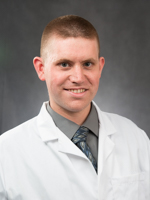A Day in the Life of an Emergency Medicine Fellow as Told by Dr. Chris Gilsdorf, DO
 I am an emergency medicine fellow at the University of Tennessee Medical Center in Knoxville. I discovered the program while applying to residencies in family medicine. The family medicine program at UT Medical Center felt like an excellent fit when I interviewed there, and the EM fellowship program was the proverbial cherry on top. Over the next three years, I had numerous opportunities to work closely with both the emergency department faculty and staff, and with Dr. Lamsen, the EM fellowship program director and a previous graduate of our family medicine program. I was very impressed by the simulation center, greatly enjoyed working with the attending physicians at UT Medical Center and was lucky to have access to all the resources inherent to a Level I trauma center.
I am an emergency medicine fellow at the University of Tennessee Medical Center in Knoxville. I discovered the program while applying to residencies in family medicine. The family medicine program at UT Medical Center felt like an excellent fit when I interviewed there, and the EM fellowship program was the proverbial cherry on top. Over the next three years, I had numerous opportunities to work closely with both the emergency department faculty and staff, and with Dr. Lamsen, the EM fellowship program director and a previous graduate of our family medicine program. I was very impressed by the simulation center, greatly enjoyed working with the attending physicians at UT Medical Center and was lucky to have access to all the resources inherent to a Level I trauma center.
In the fellowship, on average, I work about five days a week. This varies depending on my schedule, or if I am on an off-service rotation. Our shifts in the emergency department at UT Medical Center are all 12 hours. We also work three 8-hour shifts a month at East Tennessee Children’s Hospital. On average, I spend about 48 hours a week between both emergency departments.
The number of patients I normally see varies, though I average at least 12 patients per shift. I try to maintain a pace of 1.5 patients per hour, which is very attainable over several hours, though the ebb and flow of new patients can make this challenging over a full shift. I may see fewer patients than this on days with higher-acuity, higher-complexity patients, or with multiple procedures.
I feel that my primary care experience has helped me develop the skills to rapidly and efficiently treat and disposition patients with lower-acuity issues, as well as present a calm bedside manner to put patients at ease. My family medicine training has given me ample exposure to pediatrics and obstetrics, both of which are crucial to be a capable and well-rounded emergency physician.
I had worked in the emergency department at UT Medical Center for the three years prior to the fellowship, so there were few surprises in the practice of medicine there. However, I was surprised and gratified to discover, especially as my year progressed and I grew closer to the attending physicians I worked with, how collegial many of them proved to be. I experienced true mentorship on numerous occasions and support that will continue beyond the end of my fellowship. My attending physicians’ trust in me solidified throughout the year, and several would come to treat me as a colleague or even a friend.
If you are a physician interested in completing an EM fellowship, you should expect most of your time in the program to be spent in the ED. You should also be prepared for weekly didactics sessions to supplement your on-the-job experience gained in the emergency department. I have found the hands-on simulation experience with models to strengthen procedural skills, and the opportunity to run through ACLS scenarios in a no-consequences situation, to be exceedingly beneficial. Scholarly activity opportunities are encouraged and can be explored to even greater depth if this is an area of strong interest for you; I have found excellent mentorship among my attending physicians. If your fellowship program allows for opportunities to experience prehospital care, such as with our EMS colleagues, air ambulances, or the fire department, these can be very enlightening experiences, and help shed light on the interfacing between prehospital and emergency department care.
The EM fellowship at UT Medical Center is recognized by the American Academy of Emergency Physicians (AAEP) as a program that meets the high standards for physician certification developed by the Board of Certification in Emergency Medicine (BCEM). The BCEM is a Member Board of the American Board of Physician Specialties® (ABPS). For more information about BCEM certification, contact the ABPS.










